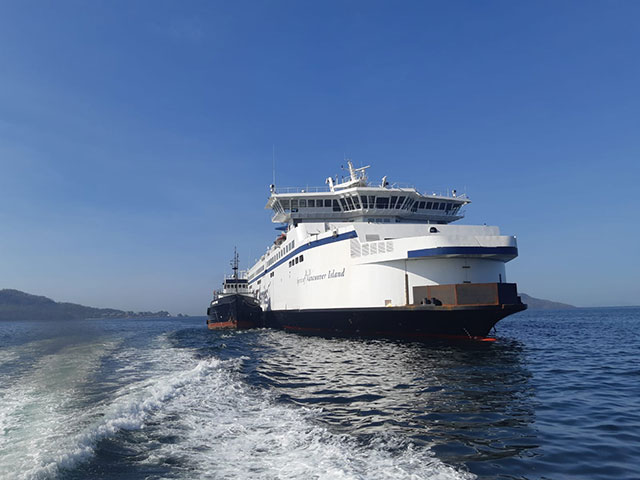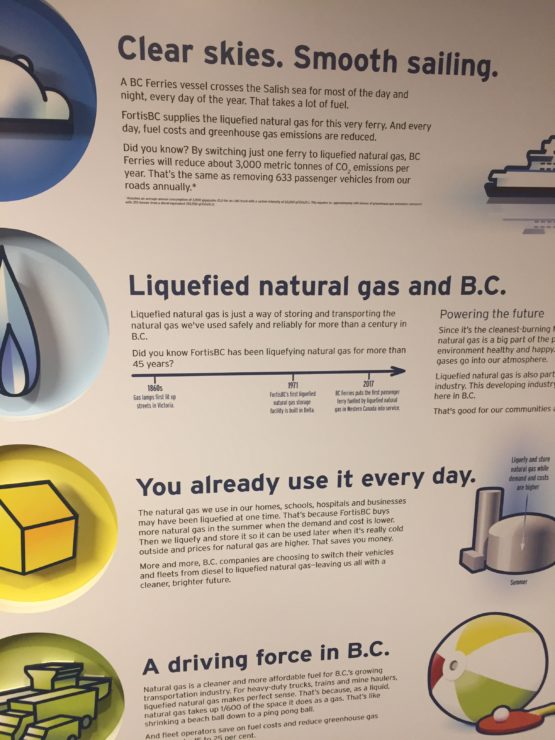New on-board signage masks the f(r)acts about Liquified Natural Gas

Perhaps you’ve made a recent trip through the Salish Sea on BC Ferries. And maybe, like me, you noticed the big sign on Deck Five with fun infographics that pique the curiosity of adults and children wandering in search of the BC Ferries’ elusive WiFi signals.
Last week I joined a group of people checking out that sign. We stood there nodding, eyes slightly glazed, as if someone was swinging a hypnotizing pendulum in front of our faces.
The sign said things in big, soft likeable letters, like that Liquified Natural Gas (LNG) is “leaving us with a cleaner, brighter future” … “You already use it everyday” … “LNG is just a way of storing and transporting the natural gas we’ve used safely and reliably for more than a century in B.C.” … “[It’s] like shrinking a beach ball down to a ping pong ball” … “Clear skies, smooth sailing” … “Natural gas is a cleaner and more affordable fuel for B.C.’s growing transportation industry.”

Excuse me? Cleaner and more affordable than what? Sure, LNG may burn better than other fossil fuels, like coal, yet there was no mention how LNG gets to the burning stage in the first place.
If you’re getting your information from peer-reviewed research and not the Deck Five propaganda, you would see through to the f(r)acts, namely that LNG is primarily extracted by fracking, which vents huge swaths of methane (86 times more potent than CO2 over a 20-year period) into the atmosphere, causes 90 per cent of big earthquakes in B.C., ruins tonnes of our province’s precious clean water (over 30 000 olympic-sized swimming pools’ worth of water were contaminated by fracking in 2015 alone), and is detrimental to the health of communities — especially Indigenous ones that are disproportionately impacted (doctors across the world are calling for a ban on fracking due to its link to cancers and other public health concerns).
It seems BC Ferries either hasn’t done its research or is intentionally attempting to brainwash the thousands of people who use its services everyday.
In any case, the corporation is not at the cutting edge of climate action.
This time last year, Washington State Ferries announced plans to convert its three largest ferries to electric power. Around the same time, a B.C. company based in Richmond made a deal to sell its new ferry battery technology to give a Sweden-based company hybrid capability for a 3.5-hour ferry trip to and from Denmark. Norway’s new ferry travels its 5.6-kilometre route 34 times daily, relying solely on electric energy.
In September 2018, a few months after these headlines hit the news, BC Ferries’ Spirit of Vancouver Island vessel departed for Poland to undergo modifications to its fuel system.
When I boarded the Spirit of Vancouver Island last week, I expected the updated ferry was now world class, given the current whirlwind of green technological developments.
But it wasn’t any greener. Instead — you guessed it — BC Ferries sent its ferry across the world to get some “new engines and a liquefied natural gas fuel system.”
BC Ferries says these LNG engines “will help reduce CO2 emissions by 12 000 tonnes annually,” but nowhere does it mention any of the science showing that when LNG’s lifecycle emissions are tallied, their greenhouse gas legacy is effectively worse than that of coal.
And get your wallets out: to cover rising fuel prices, BC Ferries just implemented a 1.5 per cent fuel surcharge for its passengers.
That same day I rode the ferry, the sign on Deck Five probably got many BC Ferries patrons excited about our “cleaner, brighter future,” sending them merrily on their way.
Meanwhile, the climate crisis looms ever closer. But don’t fret. Here are some soothing words from BC Ferries: “We’re thinking about you, the environment, and the future of travel as we design ferries that will serve Metro Vancouver and Vancouver Island for future generations.”
If BC Ferries is so concerned about the environment and future generations, then instead of painting us a fake picture, why doesn’t it step up and be a leader during the climate emergency?
Stop masking the f(r)acts, BC Ferries. The sailing isn’t “smooth” and the skies aren’t “clear.” Communities are being flooded, sea levels are rising, and we’re set to face what will likely be B.C.’s third worst wildfire season on record.
There are no excuses left, BC Ferries: use the green technology that is at your fingertips.






